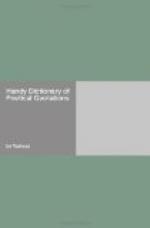=Proof.=
Give
me the ocular proof;
*
* * * *
Make me to see ’t; or, at the least, so prove
it, That the probation bear no hinge, nor loop, To
hang a doubt on. 1389
SHAKS.: Othello, Act iii., Sc. 3.
=Prophecy.=
Coming events cast their shadows before. 1390 CAMPBELL: Lochiel’s Warning.
Be thou the rainbow to the storms of life,
The evening beam that smiles the cloud away,
And tints to-morrow with prophetic ray!
1391
BYRON: Bride of Ab., Canto ii., St. 20.
=Prose.=
And he whose fustian’s so sublimely bad,
It is not poetry, but prose run mad.
1392
POPE: Prol. to Satires, Line 186.
And Sidney, warbler of poetic prose. 1393 COWPER: Task, Bk. iv., Line 514.
=Proselytes.=
The greatest saints and sinners have been made Of proselytes of one another’s trade. 1394 BUTLER: Misc. Thoughts, Line 315.
=Prospects.=
As distant prospects please us, but when near We find but desert rocks and fleeting air. 1395 SAMUEL GARTH: Dispensatory, Canto iii., Line 27.
=Prosperity.=
Prosperity’s the very bond of love;
Whose fresh complexion, and whose heart together
Affliction alters.
1396
SHAKS.: Wint. Tale, Act iv., Sc.
3.
Surer to prosper than prosperity
Could have assured us.
1397
MILTON: Par. Lost, Bk. ii., Line
39.
=Providence.=
There’s a special providence in the fall of a sparrow. 1398 SHAKS.: Hamlet, Act v., Sc. 2.
What in me is dark
Illumine, what is low raise and support;
That, to the height of this great argument,
I may assert Eternal Providence
And justify the ways of God to men.
1399
MILTON: Par. Lost, Bk. i., Line 22.
Who finds not Providence all good and wise, Alike in what it gives, and what denies? 1400 POPE: Essay on Man, Epis. i., Line 205.
’T is Providence alone secures
In every change both mine and yours.
1401
COWPER: A Fable. Moral.
=Prudence.=
Henceforth His might we know, and know our own,
So as not either to provoke, or dread
New war, provoked.
1402
MILTON: Par. Lost, Bk. i., Line 643.
Where passion leads or prudence points the way. 1403 ROBERT LOWTH: Choice of Hercules, i.
=Prudery.=
Yon ancient prude, whose wither’d features show
She might be young some forty years ago,
Her elbows pinion’d close upon her hips,
Her head erect, her fan upon her lips,
Her eyebrows arch’d, her eyes both gone astray
To watch yon amorous couple in their play,
With bony and unkerchief’d neck defies
The rude inclemency of wintry skies,
And sails, with lappet-head and mincing airs,
Duly at chink of bell to morning prayers.
1404
COWPER: Truth, Line 13.




